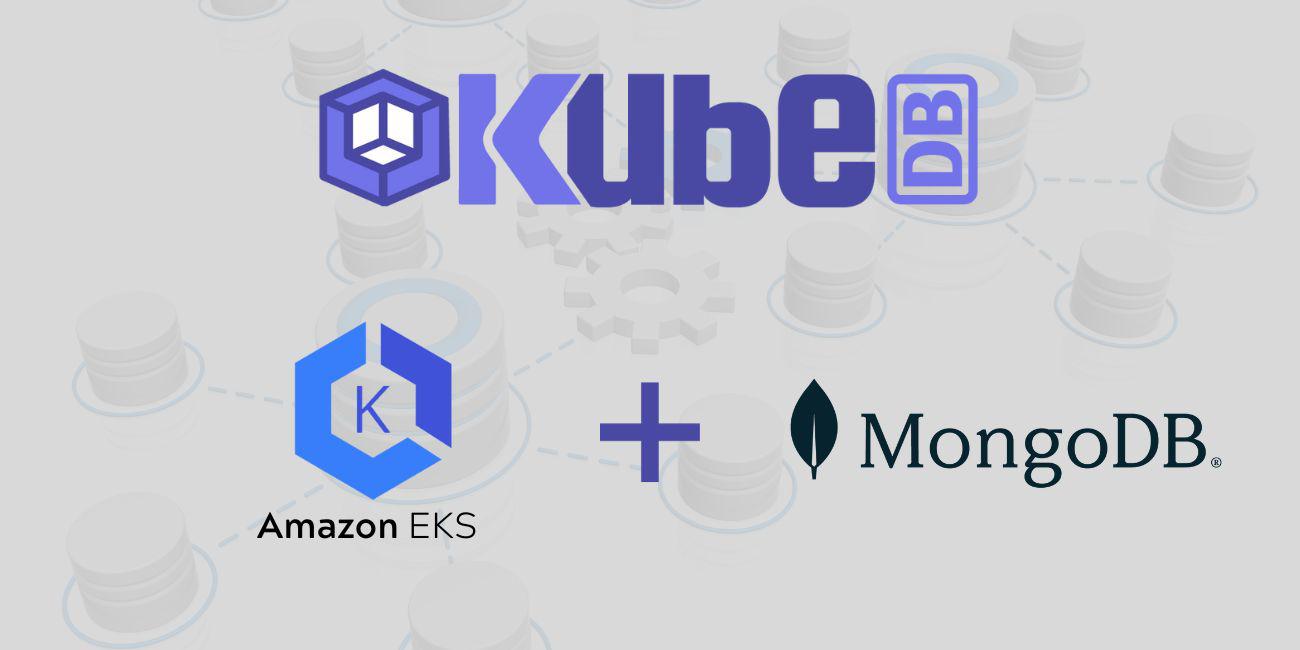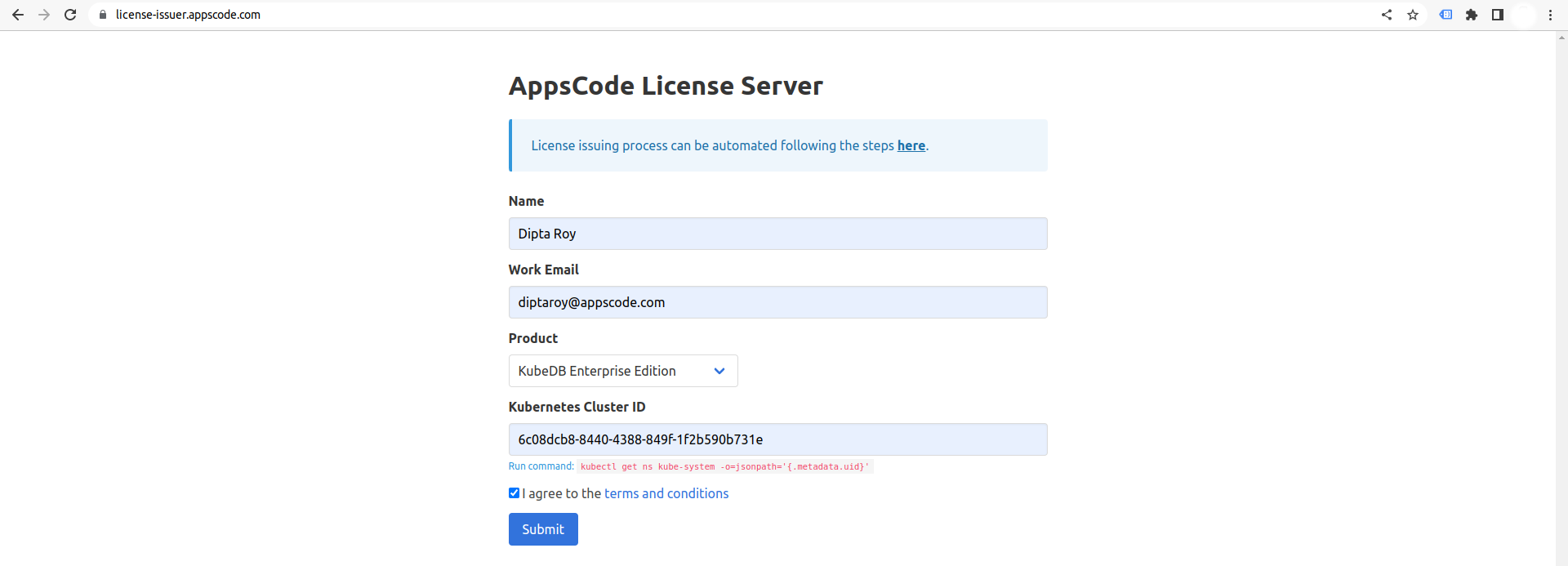
Overview
KubeDB is the Kubernetes Native Database Management Solution which simplifies and automates routine database tasks such as Provisioning, Monitoring, Upgrading, Patching, Scaling, Volume Expansion, Backup, Recovery, Failure detection, and Repair for various popular databases on private and public clouds. The databases that KubeDB supports are MongoDB, Elasticsearch, MySQL, MariaDB, Kafka, Redis, PostgreSQL, ProxySQL, Percona XtraDB, Memcached and PgBouncer. You can find the guides to all the supported databases in KubeDB . In this tutorial we will deploy MongoDB ReplicaSet with Arbiter in Amazon Elastic Kubernetes Service (Amazon EKS). We will cover the following steps:
- Install KubeDB
- Deploy MongoDB ReplicaSet with Arbiter
- Connect MongoDB with Arbiter
- Read/Write with Arbiter
Get Cluster ID
We need the cluster ID to get the KubeDB License. To get cluster ID, we can run the following command:
$ kubectl get ns kube-system -o jsonpath='{.metadata.uid}'
6c08dcb8-8440-4388-849f-1f2b590b731e
Get License
Go to Appscode License Server to get the license.txt file. For this tutorial we will use KubeDB Enterprise Edition.

Install KubeDB
We will use helm to install KubeDB. Please install helm here
if it is not already installed.
Now, let’s install KubeDB.
$ helm repo add appscode https://charts.appscode.com/stable/
$ helm repo update
$ helm search repo appscode/kubedb
NAME CHART VERSION APP VERSION DESCRIPTION
appscode/kubedb v2023.08.18 v2023.08.18 KubeDB by AppsCode - Production ready databases...
appscode/kubedb-autoscaler v0.20.0 v0.20.1 KubeDB Autoscaler by AppsCode - Autoscale KubeD...
appscode/kubedb-catalog v2023.08.18 v2023.08.18 KubeDB Catalog by AppsCode - Catalog for databa...
appscode/kubedb-community v0.24.2 v0.24.2 KubeDB Community by AppsCode - Community featur...
appscode/kubedb-crds v2023.08.18 v2023.08.18 KubeDB Custom Resource Definitions
appscode/kubedb-dashboard v0.11.0 v0.11.0 KubeDB Dashboard by AppsCode
appscode/kubedb-enterprise v0.11.2 v0.11.2 KubeDB Enterprise by AppsCode - Enterprise feat...
appscode/kubedb-grafana-dashboards v2023.08.18 v2023.08.18 A Helm chart for kubedb-grafana-dashboards by A...
appscode/kubedb-metrics v2023.08.18 v2023.08.18 KubeDB State Metrics
appscode/kubedb-one v2023.08.18 v2023.08.18 KubeDB and Stash by AppsCode - Production ready...
appscode/kubedb-ops-manager v0.22.0 v0.22.8 KubeDB Ops Manager by AppsCode - Enterprise fea...
appscode/kubedb-opscenter v2023.08.18 v2023.08.18 KubeDB Opscenter by AppsCode
appscode/kubedb-provisioner v0.35.0 v0.35.6 KubeDB Provisioner by AppsCode - Community feat...
appscode/kubedb-schema-manager v0.11.0 v0.11.0 KubeDB Schema Manager by AppsCode
appscode/kubedb-ui v2023.03.23 0.4.3 A Helm chart for Kubernetes
appscode/kubedb-ui-server v2021.12.21 v2021.12.21 A Helm chart for kubedb-ui-server by AppsCode
appscode/kubedb-webhook-server v0.11.0 v0.11.1 KubeDB Webhook Server by AppsCode
# Install KubeDB Enterprise operator chart
$ helm install kubedb appscode/kubedb \
--version v2023.08.18 \
--namespace kubedb --create-namespace \
--set kubedb-provisioner.enabled=true \
--set kubedb-ops-manager.enabled=true \
--set kubedb-autoscaler.enabled=true \
--set kubedb-dashboard.enabled=true \
--set kubedb-schema-manager.enabled=true \
--set-file global.license=/path/to/the/license.txt
Let’s verify the installation:
$ kubectl get pods --all-namespaces -l "app.kubernetes.io/instance=kubedb"
NAMESPACE NAME READY STATUS RESTARTS AGE
kubedb kubedb-kubedb-autoscaler-ccd798cf6-m5stn 1/1 Running 0 2m30s
kubedb kubedb-kubedb-dashboard-b68496968-st22m 1/1 Running 0 2m30s
kubedb kubedb-kubedb-ops-manager-65b6bf54b4-xnc2h 1/1 Running 0 2m30s
kubedb kubedb-kubedb-provisioner-8bdccf856-b6bnr 1/1 Running 0 2m30s
kubedb kubedb-kubedb-schema-manager-78cb7dbd47-c4mgk 1/1 Running 0 2m30s
kubedb kubedb-kubedb-webhook-server-75566f45d5-4mg59 1/1 Running 0 2m30s
We can list the CRD Groups that have been registered by the operator by running the following command:
$ kubectl get crd -l app.kubernetes.io/name=kubedb
NAME CREATED AT
elasticsearchautoscalers.autoscaling.kubedb.com 2023-09-18T07:11:37Z
elasticsearchdashboards.dashboard.kubedb.com 2023-09-18T07:10:59Z
elasticsearches.kubedb.com 2023-09-18T07:10:59Z
elasticsearchopsrequests.ops.kubedb.com 2023-09-18T07:11:15Z
elasticsearchversions.catalog.kubedb.com 2023-09-18T07:10:37Z
etcds.kubedb.com 2023-09-18T07:12:03Z
etcdversions.catalog.kubedb.com 2023-09-18T07:10:37Z
kafkas.kubedb.com 2023-09-18T07:11:46Z
kafkaversions.catalog.kubedb.com 2023-09-18T07:10:37Z
mariadbautoscalers.autoscaling.kubedb.com 2023-09-18T07:11:37Z
mariadbdatabases.schema.kubedb.com 2023-09-18T07:11:48Z
mariadbopsrequests.ops.kubedb.com 2023-09-18T07:11:28Z
mariadbs.kubedb.com 2023-09-18T07:11:28Z
mariadbversions.catalog.kubedb.com 2023-09-18T07:10:37Z
memcacheds.kubedb.com 2023-09-18T07:12:03Z
memcachedversions.catalog.kubedb.com 2023-09-18T07:10:37Z
mongodbautoscalers.autoscaling.kubedb.com 2023-09-18T07:11:37Z
mongodbdatabases.schema.kubedb.com 2023-09-18T07:11:48Z
mongodbopsrequests.ops.kubedb.com 2023-09-18T07:11:18Z
mongodbs.kubedb.com 2023-09-18T07:11:18Z
mongodbversions.catalog.kubedb.com 2023-09-18T07:10:37Z
mysqlautoscalers.autoscaling.kubedb.com 2023-09-18T07:11:37Z
mysqldatabases.schema.kubedb.com 2023-09-18T07:11:47Z
mysqlopsrequests.ops.kubedb.com 2023-09-18T07:11:25Z
mysqls.kubedb.com 2023-09-18T07:11:25Z
mysqlversions.catalog.kubedb.com 2023-09-18T07:10:37Z
perconaxtradbautoscalers.autoscaling.kubedb.com 2023-09-18T07:11:37Z
perconaxtradbopsrequests.ops.kubedb.com 2023-09-18T07:11:40Z
perconaxtradbs.kubedb.com 2023-09-18T07:11:40Z
perconaxtradbversions.catalog.kubedb.com 2023-09-18T07:10:37Z
pgbouncers.kubedb.com 2023-09-18T07:11:21Z
pgbouncerversions.catalog.kubedb.com 2023-09-18T07:10:37Z
postgresautoscalers.autoscaling.kubedb.com 2023-09-18T07:11:37Z
postgresdatabases.schema.kubedb.com 2023-09-18T07:11:48Z
postgreses.kubedb.com 2023-09-18T07:11:34Z
postgresopsrequests.ops.kubedb.com 2023-09-18T07:11:34Z
postgresversions.catalog.kubedb.com 2023-09-18T07:10:37Z
proxysqlautoscalers.autoscaling.kubedb.com 2023-09-18T07:11:37Z
proxysqlopsrequests.ops.kubedb.com 2023-09-18T07:11:37Z
proxysqls.kubedb.com 2023-09-18T07:11:37Z
proxysqlversions.catalog.kubedb.com 2023-09-18T07:10:37Z
publishers.postgres.kubedb.com 2023-09-18T07:11:50Z
redisautoscalers.autoscaling.kubedb.com 2023-09-18T07:11:37Z
redises.kubedb.com 2023-09-18T07:11:31Z
redisopsrequests.ops.kubedb.com 2023-09-18T07:11:31Z
redissentinelautoscalers.autoscaling.kubedb.com 2023-09-18T07:11:37Z
redissentinelopsrequests.ops.kubedb.com 2023-09-18T07:11:43Z
redissentinels.kubedb.com 2023-09-18T07:11:43Z
redisversions.catalog.kubedb.com 2023-09-18T07:10:37Z
subscribers.postgres.kubedb.com 2023-09-18T07:11:53Z
Deploy MongoDB Cluster with Arbiter
We are going to Deploy MongoDB Cluster with Arbiter by using KubeDB. First, let’s create a Namespace in which we will deploy the database.
$ kubectl create namespace demo
namespace/demo created
Here is the yaml of the MongoDB CRO we are going to use:
apiVersion: kubedb.com/v1alpha2
kind: MongoDB
metadata:
name: mongodb
namespace: demo
spec:
version: "6.0.5"
replicaSet:
name: "rs0"
replicas: 2
storageType: Durable
storage:
storageClassName: "gp2"
accessModes:
- ReadWriteOnce
resources:
requests:
storage: 512Mi
arbiter:
podTemplate: {}
terminationPolicy: WipeOut
Let’s save this yaml configuration into mongodb.yaml
Then create the above MongoDB CRO
$ kubectl apply -f mongodb.yaml
mongodb.kubedb.com/mongodb created
In this yaml,
spec.versionfield specifies the version of MongoDB. Here, we are using MongoDBversion 6.0.5. You can list the KubeDB supported versions of MongoDB by running$ kubectl get mongodbversionscommand.spec.storage.storageClassNameis the name of the StorageClass used to provision PVCs.spec.arbiterdenotes arbiter spec of the deployed MongoDB CRD. There are two fields under it, configSecret & podTemplate.spec.arbiter.configSecretis an optional field to provide custom configuration file for database (i.e mongod.cnf). If specified, this file will be used as configuration file otherwise default configuration file will be used.spec.arbiter.podTemplateholds the arbiter-podSpec.nullvalue of it, instructs kubedb operator to use the default arbiter podTemplate.spec.terminationPolicyfield is Wipeout means that the database will be deleted without restrictions. It can also be “Halt”, “Delete” and “DoNotTerminate”. Learn More about these checkout Termination Policy .
Once these are handled correctly and the MongoDB object is deployed, you will see that the following objects are created:
$ kubectl get all -n demo
NAME READY STATUS RESTARTS AGE
pod/mongodb-0 2/2 Running 0 3m46s
pod/mongodb-1 2/2 Running 0 2m32s
pod/mongodb-arbiter-0 1/1 Running 0 108s
NAME TYPE CLUSTER-IP EXTERNAL-IP PORT(S) AGE
service/mongodb ClusterIP 10.96.249.83 <none> 27017/TCP 3m51s
service/mongodb-pods ClusterIP None <none> 27017/TCP 3m51s
NAME READY AGE
statefulset.apps/mongodb 2/2 3m46s
statefulset.apps/mongodb-arbiter 1/1 108s
NAME TYPE VERSION AGE
appbinding.appcatalog.appscode.com/mongodb kubedb.com/mongodb 6.0.5 98s
NAME VERSION STATUS AGE
mongodb.kubedb.com/mongodb 6.0.5 Ready 3m51s
Let’s check if the database is ready to use,
$ kubectl get mongodb -n demo mongodb
NAME VERSION STATUS AGE
mongodb 6.0.5 Ready 4m16s
We have successfully deployed MongoDB ReplicaSet with Arbiter in AWS. Now we can exec into the container to use the database.
Accessing Database Through CLI
To access the database through CLI, we have to get the credentials to access. KubeDB will create Secret and Service for the database mongodb that we have deployed. Let’s check them using the following commands,
$ kubectl get secret -n demo -l=app.kubernetes.io/instance=mongodb
NAME TYPE DATA AGE
mongodb-auth kubernetes.io/basic-auth 2 4m37s
mongodb-key Opaque 1 4m37s
$ kubectl get service -n demo -l=app.kubernetes.io/instance=mongodb
NAME TYPE CLUSTER-IP EXTERNAL-IP PORT(S) AGE
mongodb ClusterIP 10.96.249.83 <none> 27017/TCP 4m50s
mongodb-pods ClusterIP None <none> 27017/TCP 4m50s
Now, we are going to use mongodb-auth to get the credentials.
$ kubectl get secrets -n demo mongodb-auth -o jsonpath='{.data.\username}' | base64 -d
root
$ kubectl get secrets -n demo mongodb-auth -o jsonpath='{.data.\password}' | base64 -d
lNk7SIpOW~jdav6L
Insert Sample Data
In this section, we are going to login into our MongoDB and insert some sample data.
$ kubectl exec -it mongodb-0 -n demo bash
root@mongodb-0:/# mongosh admin -u root -p 'lNk7SIpOW~jdav6L'
Using MongoDB: 6.0.5
Using Mongosh: 1.8.2
rs0 [direct: primary] admin> rs.status()
{
set: 'rs0',
date: ISODate("2023-09-18T07:28:48.328Z"),
myState: 1,
term: Long("1"),
syncSourceHost: '',
syncSourceId: -1,
heartbeatIntervalMillis: Long("2000"),
majorityVoteCount: 2,
writeMajorityCount: 2,
votingMembersCount: 3,
writableVotingMembersCount: 2,
optimes: {
lastCommittedOpTime: { ts: Timestamp({ t: 1695022119, i: 1 }), t: Long("1") },
lastCommittedWallTime: ISODate("2023-09-18T07:28:39.527Z"),
readConcernMajorityOpTime: { ts: Timestamp({ t: 1695022119, i: 1 }), t: Long("1") },
appliedOpTime: { ts: Timestamp({ t: 1695022119, i: 1 }), t: Long("1") },
durableOpTime: { ts: Timestamp({ t: 1695022119, i: 1 }), t: Long("1") },
lastAppliedWallTime: ISODate("2023-09-18T07:28:39.527Z"),
lastDurableWallTime: ISODate("2023-09-18T07:28:39.527Z")
},
lastStableRecoveryTimestamp: Timestamp({ t: 1695022069, i: 1 }),
electionCandidateMetrics: {
lastElectionReason: 'electionTimeout',
lastElectionDate: ISODate("2023-09-18T07:22:49.491Z"),
electionTerm: Long("1"),
lastCommittedOpTimeAtElection: { ts: Timestamp({ t: 1695021769, i: 1 }), t: Long("-1") },
lastSeenOpTimeAtElection: { ts: Timestamp({ t: 1695021769, i: 1 }), t: Long("-1") },
numVotesNeeded: 1,
priorityAtElection: 1,
electionTimeoutMillis: Long("10000"),
newTermStartDate: ISODate("2023-09-18T07:22:49.508Z"),
wMajorityWriteAvailabilityDate: ISODate("2023-09-18T07:22:49.517Z")
},
members: [
{
_id: 0,
name: 'mongodb-0.mongodb-pods.demo.svc.cluster.local:27017',
health: 1,
state: 1,
stateStr: 'PRIMARY',
uptime: 372,
optime: { ts: Timestamp({ t: 1695022119, i: 1 }), t: Long("1") },
optimeDate: ISODate("2023-09-18T07:28:39.000Z"),
lastAppliedWallTime: ISODate("2023-09-18T07:28:39.527Z"),
lastDurableWallTime: ISODate("2023-09-18T07:28:39.527Z"),
syncSourceHost: '',
syncSourceId: -1,
infoMessage: '',
electionTime: Timestamp({ t: 1695021769, i: 2 }),
electionDate: ISODate("2023-09-18T07:22:49.000Z"),
configVersion: 4,
configTerm: 1,
self: true,
lastHeartbeatMessage: ''
},
{
_id: 1,
name: 'mongodb-1.mongodb-pods.demo.svc.cluster.local:27017',
health: 1,
state: 2,
stateStr: 'SECONDARY',
uptime: 315,
optime: { ts: Timestamp({ t: 1695022119, i: 1 }), t: Long("1") },
optimeDurable: { ts: Timestamp({ t: 1695022119, i: 1 }), t: Long("1") },
optimeDate: ISODate("2023-09-18T07:28:39.000Z"),
optimeDurableDate: ISODate("2023-09-18T07:28:39.000Z"),
lastAppliedWallTime: ISODate("2023-09-18T07:28:39.527Z"),
lastDurableWallTime: ISODate("2023-09-18T07:28:39.527Z"),
lastHeartbeat: ISODate("2023-09-18T07:28:46.871Z"),
lastHeartbeatRecv: ISODate("2023-09-18T07:28:46.871Z"),
pingMs: Long("0"),
lastHeartbeatMessage: '',
syncSourceHost: 'mongodb-0.mongodb-pods.demo.svc.cluster.local:27017',
syncSourceId: 0,
infoMessage: '',
configVersion: 4,
configTerm: 1
},
{
_id: 2,
name: 'mongodb-arbiter-0.mongodb-pods.demo.svc.cluster.local:27017',
health: 1,
state: 7,
stateStr: 'ARBITER',
uptime: 281,
lastHeartbeat: ISODate("2023-09-18T07:28:46.872Z"),
lastHeartbeatRecv: ISODate("2023-09-18T07:28:47.000Z"),
pingMs: Long("0"),
lastHeartbeatMessage: '',
syncSourceHost: '',
syncSourceId: -1,
infoMessage: '',
configVersion: 4,
configTerm: 1
}
],
ok: 1,
'$clusterTime': {
clusterTime: Timestamp({ t: 1695022119, i: 1 }),
signature: {
hash: Binary(Buffer.from("fe08f082ee8ad4de7dd57e57b293095d15e7fced", "hex"), 0),
keyId: Long("7280063063863066631")
}
},
operationTime: Timestamp({ t: 1695022119, i: 1 })
}
Here you can see the arbiter pod in the members list of rs.status() output.
rs0 [direct: primary] admin> rs.isMaster().primary
mongodb-0.mongodb-pods.demo.svc.cluster.local:27017
rs0 [direct: primary] admin> show dbs
admin 172.00 KiB
config 288.00 KiB
kubedb-system 40.00 KiB
local 428.00 KiB
rs0 [direct: primary] admin> show users
[
{
_id: 'admin.root',
userId: new UUID("c5387bf3-5ad5-43f4-b7dc-73dea0f810b9"),
user: 'root',
db: 'admin',
roles: [ { role: 'root', db: 'admin' } ],
mechanisms: [ 'SCRAM-SHA-1', 'SCRAM-SHA-256' ]
}
]
rs0 [direct: primary] admin> use musicdb
switched to db musicdb
rs0 [direct: primary] musicdb> db.songs.insert({"name":"Annie's Song"});
DeprecationWarning: Collection.insert() is deprecated. Use insertOne, insertMany, or bulkWrite.
{
acknowledged: true,
insertedIds: { '0': ObjectId("6507fcee87f0f74bc51d6ddd") }
}
rs0 [direct: primary] musicdb> exit
We’ve successfully inserted some sample data to our MongoDB database. More information about Run & Manage MongoDB on Kubernetes can be found Kubernetes MongoDB
Now, To check the data availability to the secondary members we’ll now exec into mongodb-1 pod (which is secondary member right now).
$ kubectl exec -it mongodb-1 -n demo bash
root@mongodb-1:/# mongosh admin -u root -p 'lNk7SIpOW~jdav6L'
Using MongoDB: 6.0.5
Using Mongosh: 1.8.2
rs0 [direct: secondary] admin> rs.secondaryOk()
DeprecationWarning: .setSecondaryOk() is deprecated. Use .setReadPref("primaryPreferred") instead
Setting read preference from "primary" to "primaryPreferred"
rs0 [direct: secondary] admin> show users
[
{
_id: 'admin.root',
userId: new UUID("c5387bf3-5ad5-43f4-b7dc-73dea0f810b9"),
user: 'root',
db: 'admin',
roles: [ { role: 'root', db: 'admin' } ],
mechanisms: [ 'SCRAM-SHA-1', 'SCRAM-SHA-256' ]
}
]
rs0 [direct: secondary] admin> use musicdb
switched to db musicdb
rs0 [direct: secondary] musicdb> db.songs.find().pretty()
[ { _id: ObjectId("6507fcee87f0f74bc51d6ddd"), name: "Annie's Song" } ]
rs0 [direct: secondary] musicdb> exit
we’ve successfully access the data in
mongodb-1. So, the data is available to the secondary members.
If you want to learn more about Production-Grade MongoDB you can have a look into that playlist below:
Support
To speak with us, please leave a message on our website .
To receive product announcements, follow us on Twitter .
To watch tutorials of various Production-Grade Kubernetes Tools Subscribe our YouTube channel.
More about MongoDB in Kubernetes
If you have found a bug with KubeDB or want to request for new features, please file an issue .










